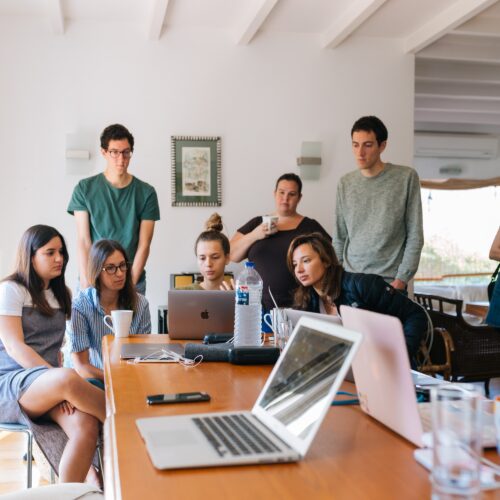The Literature Festival in Lillehammer has been held since the mid-1990s. The festival is an annual event with up to 300 program items taking place simultaneously over the course of a short week in the spring. The target audience is naturally literature enthusiasts in general. However, there are also events aimed at more specific groups, such as children, young people, non-fiction authors, and critics.

Authors and other contributors from both domestic and international backgrounds are invited to give presentations, showcase their work, engage in discussions, and contribute in other ways.
The festival is organized as a foundation and is financed through various means, including public subsidies (58 percent), sponsors (30 percent), and ticket sales. It has a board and council, and the organizing staff consists of some employees, numerous volunteers, and partners. These partners include publishers, charitable foundations, and others.
The festivals in 2020 and 2021 were, of course, heavily impacted by the pandemic situation. Before embarking on full planning for the next festival, it may be useful to assess certain aspects. The pandemic has brought awareness to many event organizers, including the Literature Festival. Uncertainty is a significant and complex issue in projects and events, which the Literature Festival will also address in the future.
Imagine that you have been tasked with providing an outsider’s perspective on uncertainty in projects. It is assumed that you have limited detailed insight into the festival organization and its projects. The festival management wants you to make some assessments related to uncertainty and its management.
First, you should provide a general, concise assessment of uncertainty related to projects. Why is uncertainty a condition for projects, and what is particularly important to be aware of in projects concerning uncertainty management?
Uncertainty is a condition for projects because every project involves a certain degree of uncertainty concerning goal achievement, resource utilization, schedule planning, and other factors. Uncertainty arises due to various factors, such as changes in the market, technological advancements, evolving requirements and needs, external influences, and unforeseen events. It is essential to be attentive to uncertainty management in projects because mishandling uncertainty can lead to cost overruns, delays, reduced quality, and, in some cases, project failure. Effective uncertainty management can contribute to better planning, risk reduction, and improved decision-making throughout the project.
Next, you should present different types of uncertainty based on understanding and classification, and illustrate these types with examples. Please feel free to provide examples that are relevant to the Literature Festival.
There are several types of uncertainty that may be relevant to the Literature Festival. Some examples include:
• Technical uncertainty: This could involve technical issues with the event’s infrastructure, audio and lighting systems, ticketing systems, or power outages that could impact the execution of the events.
• Financial uncertainty: This may include uncertainties related to ticket sales, sponsor agreements, or public grants. Changes in economic conditions can affect the festival’s finances and resource availability.
• Logistic uncertainty: This could encompass uncertainties related to transportation, accommodation, catering, and other logistical needs for authors and contributors coming from both domestic and international locations. Changes in travel restrictions or logistical issues can impact the execution of the events.
• Program-related uncertainty: This may involve uncertainties related to the participation of authors or other contributors, changes in the program due to unforeseen events, or cancellations.
Furthermore, you should attempt to formulate a strategy on how an organization like the Literature Festival can generally facilitate uncertainty management, making it a natural and integrated part of the festival’s planning process.
To facilitate uncertainty management in the Literature Festival, the following strategies can be considered:
• Identify and assess uncertainty: Through thorough analysis and evaluation of potential uncertainty factors, the festival can identify and quantify risks. This can be achieved by involving the festival’s staff, board, council, and partners in the risk assessment process.
• Develop an uncertainty plan: Based on the identified risks, a plan should be developed that outlines the actions to be taken to manage and reduce uncertainty. This may involve alternative plans, contingency procedures, and emergency plans for different scenarios.
• Flexibility and planning for change: The festival should adopt a flexible approach to planning and be prepared to handle changes and unforeseen events. This can include allocating resources and budget items for unforeseen expenses or having alternative solutions ready to address changes in the program or participation.
• Communication and collaboration: Effective communication and collaboration internally within the festival’s organization and externally with partners, authors, and contributors are essential for uncertainty management. Clear and regular communication about changes, risk-reducing measures, and alternative plans can help reduce uncertainty and build trust.
If you were to highlight specific aspects that you believe would be particularly important to emphasize in the planning and execution of the festival, what would they be, and how would you justify it?
In the planning and execution of the festival, it is important to emphasize the following aspects:
• Continuous monitoring of the situation: The festival should keep track of relevant information and updates related to the pandemic situation and other external factors that may impact the event. This includes staying updated on current guidelines, changes in health protocols, and any travel restrictions.
• Flexibility in the program: Having a flexible program that can adapt to changes and unforeseen events is crucial. This may involve having alternative events or digital solutions to ensure the execution of the activities even under unfavorable conditions.
• Diversification of funding sources: Seeking various funding sources can help reduce the risks associated with financing. Having multiple sponsors and partners and considering alternative revenue streams can contribute to financial stability even in the case of changes or disruptions in some funding sources.
• Collaboration with local authorities and stakeholders: Establishing strong collaborative relationships with local authorities, charitable foundations, publishers, and other stakeholders can ensure support and resources in uncertain situations. This may involve involving local authorities in the planning process and establishing clear communication channels to address any challenges.
This case is taken from the book “Verdiskapende Prosjektledelse” – 2022, 2. Edition, by Torgeir Skyttermoen og Anne Live Vaagaasar.




